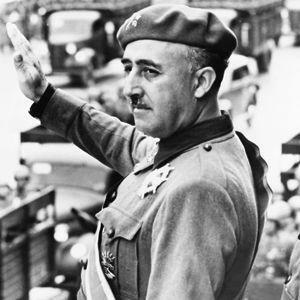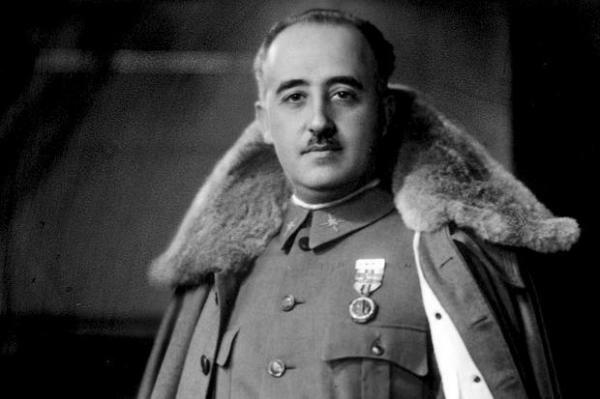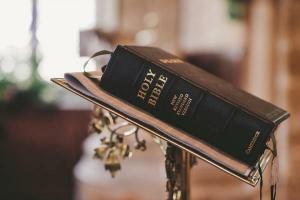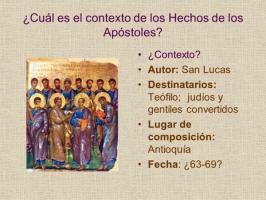Brief biography of Francisco Franco

Image: La Gaceta
Francisco Franco Bahamonte He was a Spanish military and dictator. Member of the military pronouncement of 1936 against the Second Republic that carried out a Civil War between 1936 and 1939, he established a dictatorship being himself the Head of State with fascist reminiscences that remained until his death giving name to a new period within the Contemporary Age: Francoism (1939 -1975). Next, in this lesson from a TEACHER we offer you a short biography of Francisco Franco, a character known in history as "the leader of Spain."
We started this short biography of Francisco Franco indicating that he was born in Ferrol (La Coruña) into a middle-class family with a seafaring tradition. The characters of his parents often collided and ended up causing the breakdown of both, with his mother taking over education. East chose the military career entering in 1907 in the Military Academy of Toledo, three years later in 1910 he obtained the rank of second lieutenant of infantry.
He began his military career being posted to Morocco between 1912 and 1916, which was then in war, there on his own merits he was rising in rank because by 1923 he was already the Head of the Legion and by 1926
the youngest general in Europe with only 34 years.From this moment, Francisco Franco continued his career under different political regimes, in 1928 he was appointed director of the Military Academy of Zaragoza by the dictator Miguel Primo de Rivera until 1931 when Manuel Azaña, Minister of War of the Republican provisional government ordered his closing. During the republican period he participated in the coercion of the Revolution of Asturias (1934), he was commander of the Spanish army in Morocco and chief of the Central General Staff in 1936, this same year he was assigned to the command of Gran Canarias.
Franco was a politician with conservative ideas for he valued authority and order above all else. He was alien to the parliamentary regime, liberalism and democracy of which he accused were the culprits of the decline of Spain; He saw in the army the essence of patriotism and the security of national unity.
These last reasons were the ones that led Franco to join the conspiracy organized by a group of soldiers to rise up against the Republic That began on July 17, the coup ended up failing causing a Civil War that lasted three years (1936 -1939) and the rise of Franco to power.
In this video of a PROFESSOR we discover you Spain before the Civil War.
We continue this short biography of Francisco Franco speaking, now, of the reason why he is such a nationally and internationally recognized character: because of the dictatorship.
It was on October 1, 1936 when his comrades in arms met at the National Defense Board in Burgos. elected Francisco Franco as generalissimo of the military forces and head of state. In 1937 he was proclaimed leader of the Spanish Traditionalist Falange after the union of the Spanish Falange and the JONS with the traditionalists.
End of the Civil War imposed in Spain a new dictatorship regime that he followed the fascist line of his allies Hitler and Mussolini. Even so, he did not involve Spain at all in World War II (1939-1945) as the weakness after the Civil War took its toll on him.
In an interview with Hitler in Hendaye he managed to delay his entry into the war in exchange for sending volunteer troops (blue division) to fight alongside the Germans against the USSR. Once the war ended with the victory of the allies, a new order will lead the newly created UN to withdraw its members from the Spanish embassies for having supported Franco the defeated, which meant the closing the borders with France.
In this other lesson we will tell you some concepts to understand the Spanish Civil War.

Image: Where is
And we finish this short biography of Franco to discover what his political ideas were ideologically based on. The ideology of Francoism It could be defined as a particular dictatorship of an authoritarian character, heavily influenced by fascist ideas, confessional by the influence of the Church in its politics, unitary highlighted its centralist nationalism, clearly conservative and reactionary.
Economically, it was decided by a policy of self-sufficiency which led Spain to stagnation, while the rest of the European countries recovered. However, the idea of strengthening the alliance with the US. The United States carried out a flourishing economic liberalization thanks to the Stabilization Plan of 1959.
During the following years, Spain experienced a stage of rapid economic growth, urbanization and industrialization without However, Franco was denied his objective of incorporating Spain into the European Economic Community, the Council of Europe or the NATO.
On November 20, 1975, Franco died in a Madrid hospital, two days later Don Juan Carlos de Borbón was appointed King of Spain with the name of Juan Carlos I, giving rise not to a period of political continuity but to a period of transition to democracy.
He is currently buried together with José Antonio Primo de Rivera, founder of the Spanish Falange in the Valley of the Fallen, a monumental complex ordered to be built by him in order to bury all those who died fighting in his glorious crusade.



